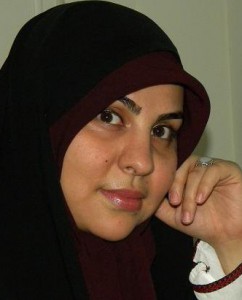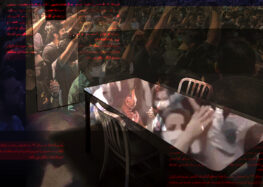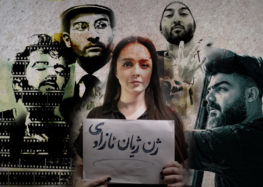Young Political Activist Receives 50 Lashes for Blogging
 Somayeh Tohidlou, political activist and Tehran University Ph.D. student in Sociology, wrote in her blog yesterday that authorities at Evin Prison carried out her sentence of 50 lashes. The flogging took place at Evin Prison just as Mahmoud Ahmadinejad took off for New York to attend the United Nations General Assembly. Flogging is an inhumane punishment and a type of torture frequently used by the Iranian Judiciary for both regular and political suspects.
Somayeh Tohidlou, political activist and Tehran University Ph.D. student in Sociology, wrote in her blog yesterday that authorities at Evin Prison carried out her sentence of 50 lashes. The flogging took place at Evin Prison just as Mahmoud Ahmadinejad took off for New York to attend the United Nations General Assembly. Flogging is an inhumane punishment and a type of torture frequently used by the Iranian Judiciary for both regular and political suspects.
The International Campaign for Human Rights in Iran demands the termination of all types of punishment that violate Iran’s international commitments to human rights conventions, and asks Iran to follow common international laws that prohibit torture.
Somayeh Tohidlou was arrested on 14 June 2009, only two days after the presidential election, and spent 70 days in prison. She was later released on a $200,000 bail. A lower court sentenced her to one year in prison and 50 lashes, and an appeals court eliminated the one year prison sentence but upheld the flogging sentence.
According to Kaleme website, Somayeh Tohidlou’s prison and flogging sentence was related to her blogging and other internet activities. Other sources state that the reason for her prosecution was her active involvement in planning a human chain between two squares in Northern and Southern Tehran in support of Mir Hossein Mousavi’s presidential campaign in 2009. During the months leading up to the 2009 election, Tohidlou was active in Mir Hossein Mousavi’s campaign. It is reported that Tohidlou appeared at Evin Prison on Wednesday to receive her flogging sentence, and that the sentence was carried out. No detailed information is yet available on how the flogging was carried out, except that the Judiciary officer who performed the flogging was a man.
Somayeh Tohidlou’s flogging has astonished many social and political activists and many others on the internet. Floggings occur infrequently because in many cases when a judge sentences convicts to flogging, they may pay fines in lieu of the punishment.
During a press conference on 11 October 2010, Iran’s Prosecutor General Gholamhossein Mohseni Ejehi stated that 61 individuals convicted after Iran’s post-election protests had been sentenced to lashes in addition to prison terms. “In addition to prison terms, some convicts have also been sentenced to lashes. In some cases, the convicts’ prison and flogging sentences may have been changed to cash fines,” he said. Mohseni Ejehi is one of eight Iranian officials placed on the US sanctions list for serious violations of human rights. He is also one of the individuals whose profile appears on the Campaign’s report Men of Violence.
While limb amputation, flogging, and stoning are all considered legal punishments according to Iran’s Islamic Penal Code, they are considered torture and cruel and unusual punishments and as such are illegal according to international laws. In 2009, the UN General Assembly expressed its “deep concern about the continuation and repetition of violations of human rights in the Islamic Republic of Iran pertaining to torture and cruel, inhumane, and degrading treatment and punishments such as flogging and limb amputations,” as well as stoning. Gholamhossein Esmaili, Head of the Prisons Organization, has stated that torture in Iranian prisons “is an outrageous lie.” Iranian judicial and other officials do not consider limb amputation, flogging, and stoning as acts of torture.






